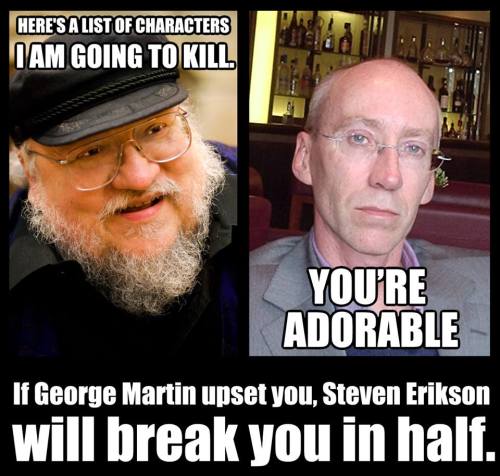Deficient worldview ?

Relax, you're not what you watch.
Ummm... I am relaxed.
I just see contradiction in your posts, so I don't get it.
You seem to have a pretty critical judgment of the author's intent and motivation, so I don't understand how you find it enjoyable to watch.
....
As far as some of the other comments, the reality is that a helmet wouldn't have saved Oberyn. That's pretty obvious. Tyrion was making a quip, that happened to have some ironic effect, but it wouldn't have mattered. I doubt that was the point.
And skipping past the obvious brutality of the world (where the poor and weak really don't have many options), I also think we're seeing one of the problems with revenge and violence as a solution to past violence. The fantasy trope typically is to honor revenge and violence as long as it's done in pursuit of justice, and very often the good guy (even if abused and suffering horribly) still manages to pull out victory either by downright winning and enjoying his victory or by somehow making a noble sacrifice that still ends up saving the day.
We can even take one of the obvious comparison points, "The Princess Bride," to examine this in detail. Wesley of course is eventually victorious, managing to conquer all of his foes through superior wit, swordplay, and intimidation. But then we get Inigo Montoya, who spends his entire life planning to get revenge on the guy who murdered his dad; he allows it to consume him; and, although there's a small blip near the end, somehow the spirit of his dead father guides his hand. His "moral rightness" allows him to emerge victorious and happy, without any real repercussion to him emotionally or psychologically from the obsession of training himself to kill this one man.
Is that an honest portrayal of the impact of the revenge fantasy upon the one who allows it to consume him? The reality is that revenge becomes an obsession; violence begets violence; potentially better outcomes are lost; the moral high ground so easily assumed can be lost in a heartbeat. Typically those who are consumed by revenge are destroyed by it.
So which of the stories is more honest? Which is more disappointing?
I don't see these things necessarily as revolving around "shock value" as has been so blithely put, although they certainly WERE shocking. Having one's expectations and the belief that one's motives justify one's actions dashed to the ground is extremely jolting. But it also makes us think again about what justifications we make to ourselves. Ellaria is alone, now, for the rest of her life, because of the obsessions of the past. I think it was a huge wake-up call, that nothing is necessarily ever justified and that one must remain conscious of one's choices and behaviors regardless of what has been done to them in the past. I foresee Arya having similar difficulty if she continues down the road of moral effusiveness, and many characters and events in this story seem to be harbingers of later characters and events.
We're seeing problems with Good people who are noble but not cunning, and we're seeing problems with Good people who are passionate but too headstrong. Good won't triumph just because it's good, it'll be because it manages to be as wise as a serpent, as peaceful as a dove, as resilient as steel, as flexible as the wind.




